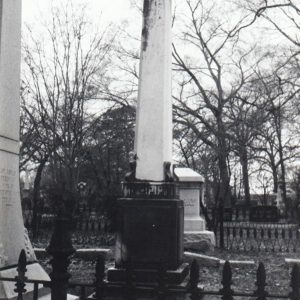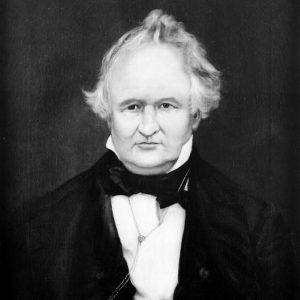calsfoundation@cals.org
Chester Ashley (1791–1848)
Chester Ashley was prominent in territorial and antebellum Arkansas. He was involved in the dispute over ownership of the site of Little Rock (Pulaski County), the Bowie land claims, and the ill-fated State and Real Estate Banks, as well as being the pre-eminent appellate attorney of the period. He was a member of the powerful Conway-Sevier-Johnson political faction, which controlled state politics until the Civil War. In addition, he was the third Arkansan elected to the U.S. Senate and was probably the wealthiest Arkansan for much of his life because of his land holdings.
Chester Ashley was born on June 1, 1791, in Amherst, Massachusetts, to William Ashley and Nancy Pomeroy. Some sources list his birth year as 1790, but the Ashley genealogy and his tombstone both have it as 1791. In 1797, the family moved to Hudson, New York, where Ashley lived until he left for Williams College in Williamstown, Massachusetts. He graduated from Williams in 1813 and then attended Litchfield Law School in Litchfield, Connecticut, where he is listed as a member of the class of 1814. He briefly practiced law in Hudson.
Like many young men at the time, he moved to the frontier, first settling in Edwardsville, Illinois, and later Missouri. He moved to “the little rock” in Arkansas in 1820 and married Mary Watkins Worthington Elliott of St. Genevieve, Missouri, in 1821. At the time, Little Rock was a small group of log houses in the Arkansas Territory, but it was soon to become the territorial capital. Ashley was one of the first lawyers to settle in Little Rock. He was a key figure in the dispute over the ownership of the land on which the town was to be built. Two groups of speculators held conflicting claims to the location of what is today downtown Little Rock. Ashley represented the faction comprised of James Bryan, William O’Hara, Amos Wheeler, and Governor James Miller, who claimed through a New Madrid certificate. William Russell headed the other faction, which also included Robert Crittenden, Henry Conway, Judge Andrew Scott, and a number of other prominent citizens, who claimed through pre-emption. Although Ashley’s faction lost in court, the two sides compromised and split up downtown Little Rock between them. Ultimately, Ashley’s ownership of much of the site would contribute to his wealth.
Ashley practiced law in a brief partnership with Robert Crittenden, the territorial secretary, and later with George Watkins, who would serve as chief justice of the Arkansas Supreme Court.
His career was not spotless. He represented John Bowie in the fraudulent Bowie land claims and was indicted for suborning a jury. He was continually accused of fraudulent land speculation and behind-the-scenes political manipulation and was a director of the disastrous State Bank. Despite these flaws, he was a consummate litigator and appeals attorney and participated in more appeals before the Arkansas Territorial Superior Court than any other attorney. He built a mansion in Little Rock, on the south side of Markham Street between Scott and Cumberland streets. He was also a slave owner.
In 1844, Ashley was elected as a Democrat to the U.S. Senate to fill the vacancy left by the death of William S. Fulton. Although a freshman senator, he was appointed chairman of the Senate Committee on the Judiciary. He was reelected in 1846 and served until his death in Washington DC on April 29, 1848. He is buried in Mount Holly Cemetery in Little Rock, which is on land he donated to the city for the cemetery. Ashley County is named for him, as are Chester and Ashley streets in Little Rock.
For additional information:
Chester Ashley Papers (UALR MS.0091). Center for Arkansas History and Culture. University of Arkansas at Little Rock, Little Rock, Arkansas.
Ruple, Susan Hamner. “The Life and Times of Chester Ashley, 1791–1848.” MA thesis, University of Arkansas, 1983.
Rose, U. M. “Chester Ashley.” Publications of the Arkansas Historical Association. Vol. 3. Fayetteville: Arkansas Historical Association, 1911.
Lynn Foster
UALR Bowen School of Law
 Ashley Grave
Ashley Grave  Chester Ashley
Chester Ashley 



Comments
No comments on this entry yet.